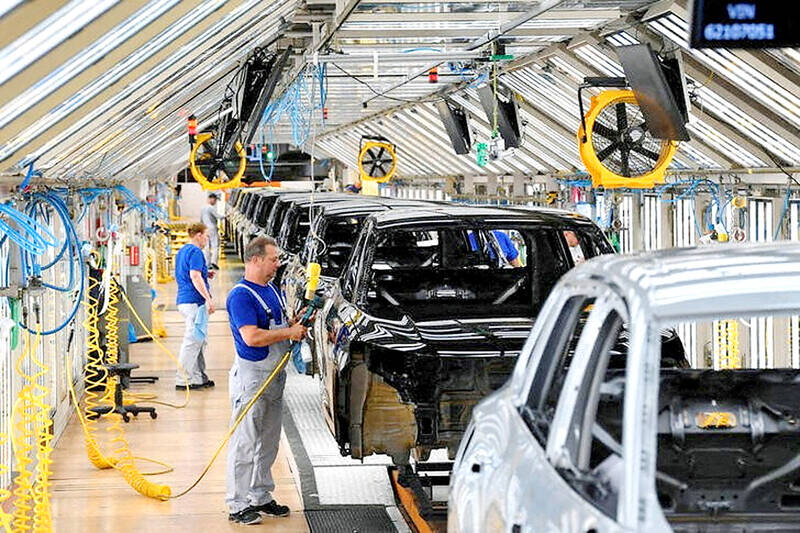Volkswagen AG (VW) and its oldest Chinese partner plan to shutter one plant in China and possibly more in response to slowing demand for combustion-engine cars, in a further pullback after the venture’s first factory ceased output.
The company’s four-decade-old business with SAIC Motor Corp (上海汽車集團) is preparing to close a factory in Nanjing as soon as next year, people familiar with the matter said. The site, which makes VW Passat and Skoda cars, has an annual capacity of as many as 360,000 vehicles.
At its Shanghai base, SAIC VW Automobile Co (上汽大眾汽車) stopped production two years ago at one factory that had been open since the mid-1980s. A second plant has reduced output and could also be shut or overhauled, said the people, who asked not to be named before final decisions are made.

Photo: Reuters
The partners are also conducting a strategy review of VW’s mass-market Skoda brand after a steep drop in sales, the company confirmed, underscoring the magnitude of the difficulties the automaker faces in China. A facility in Ningbo, in Zhejiang Province, that makes several Skoda models is being idled for months at a time and also is being considered for closure, the people said.
“All SAIC VW factories are operating normally according to the market requirements and our forecast,” VW China said in an e-mail.
As the focus shifts toward smart electric vehicles (EVs), “we are also transforming vehicle production and the components plants step by step,” it said.
The unprecedented retreat in VW’s biggest market is being driven by a consumer slump and a rapid shift toward EVs that has left the German manufacturer with too much conventional automaking capacity.
Production at VW’s 39 Chinese plants last year remained more than a quarter below its peak before Covid-19. Its share of operating earnings from its Chinese ventures fell 20 percent last year to 2.62 billion euros (US$2.92 billion), and is down by about half from its highest level in 2015.
SAIC has also suffered from weak sales. Profits from the joint venture with VW have been falling for five years, from a peak of 28 billion yuan (US$3.9 billion) in 2018 to just 3.13 billion yuan in 2023.
VW is reassessing its Chinese footprint as it weighs plant closures at home, highlighting the complex challenges the company must navigate to stay ahead of a perilous and uneven global transition away from fossil fuel vehicles.
While VW and other manufacturers were caught off-guard by stagnating EV demand in Europe this year, electrification is rapidly moving ahead in China. There, local rivals such as BYD Co (比亞迪) have seized the upper hand with innovative and affordable models.
Across China, sales of battery EVs and plug-in hybrids rose 43 percent last month to 1.03 million units from a year earlier, the country’s passenger car association said. Sales of such vehicles surpassed 6 million for the first eight months of the year.
Volkswagen has spent four decades building its carmaking capacity in China, starting with the venture with state-owned SAIC in 1985. By the end of last year, VW had more than 90,000 employees in China.
At SAIC-VW alone, factory utilization last year stood at about 58 percent of a 2.1 million-car ceiling, according to SAIC’s annual report. Scaling back would save costs for its co-owners as they seek to strengthen their hand in EVs.

Intel Corp chief executive officer Lip-Bu Tan (陳立武) is expected to meet with Taiwanese suppliers next month in conjunction with the opening of the Computex Taipei trade show, supply chain sources said on Monday. The visit, the first for Tan to Taiwan since assuming his new post last month, would be aimed at enhancing Intel’s ties with suppliers in Taiwan as he attempts to help turn around the struggling US chipmaker, the sources said. Tan is to hold a banquet to celebrate Intel’s 40-year presence in Taiwan before Computex opens on May 20 and invite dozens of Taiwanese suppliers to exchange views

Application-specific integrated circuit designer Faraday Technology Corp (智原) yesterday said that although revenue this quarter would decline 30 percent from last quarter, it retained its full-year forecast of revenue growth of 100 percent. The company attributed the quarterly drop to a slowdown in customers’ production of chips using Faraday’s advanced packaging technology. The company is still confident about its revenue growth this year, given its strong “design-win” — or the projects it won to help customers design their chips, Faraday president Steve Wang (王國雍) told an online earnings conference. “The design-win this year is better than we expected. We believe we will win

Chizuko Kimura has become the first female sushi chef in the world to win a Michelin star, fulfilling a promise she made to her dying husband to continue his legacy. The 54-year-old Japanese chef regained the Michelin star her late husband, Shunei Kimura, won three years ago for their Sushi Shunei restaurant in Paris. For Shunei Kimura, the star was a dream come true. However, the joy was short-lived. He died from cancer just three months later in June 2022. He was 65. The following year, the restaurant in the heart of Montmartre lost its star rating. Chizuko Kimura insisted that the new star is still down

While China’s leaders use their economic and political might to fight US President Donald Trump’s trade war “to the end,” its army of social media soldiers are embarking on a more humorous campaign online. Trump’s tariff blitz has seen Washington and Beijing impose eye-watering duties on imports from the other, fanning a standoff between the economic superpowers that has sparked global recession fears and sent markets into a tailspin. Trump says his policy is a response to years of being “ripped off” by other countries and aims to bring manufacturing to the US, forcing companies to employ US workers. However, China’s online warriors